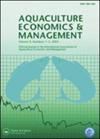资本结构与企业绩效:代理理论在地中海水产养殖企业中的应用
IF 3.8
2区 经济学
Q1 AGRICULTURAL ECONOMICS & POLICY
引用次数: 15
摘要
摘要本研究使用企业层面的面板数据来确定克罗地亚、意大利、西班牙、法国和希腊地中海水产养殖生产企业之间的绩效杠杆关系。随机前沿生产函数用于通过企业级效率估计来确定和定义绩效。采用多级内部工具变量法来确定绩效与杠杆之间的因果关系。我们的研究结果表明,在2008-2016年期间,所有公司的技术效率都在提高。代理成本假说认为杠杆与绩效呈倒U型关系。这意味着杠杆率随着效率的提高而增加,但在杠杆率足够高时,效率开始下降。这种反向关系证实了特许经营价值假说,该假说认为,效率高的公司将试图通过持有更多的股权资本来保护其高收入的价值。研究结果对地中海地区产生了影响。本文章由计算机程序翻译,如有差异,请以英文原文为准。
Capital structure and firm performance: Agency theory application to Mediterranean aquaculture firms
Abstract The study uses firm level panel data to determine performance-leverage relationships among Mediterranean aquaculture production firms in Croatia, Italy, Spain, France and Greece. A stochastic frontier production function is used to determine and define performance through firm level efficiency estimates. The multilevel internal instrument variable approach is employed to identify the causal relationships between performance and leverage. Our results show that technical efficiency has been increasing across all firms over the period 2008–2016. The agency-cost hypothesis holds such that leverage has an inverted U-shaped relationship with performance. This implies that leverage increases with efficiency, but efficiency begins to decrease at sufficiently higher levels of leverage. The reverse relationship confirms the franchise-value hypothesis, which states that firms with high efficiency will try to protect the value of their high income by holding more equity capital. Implications for the results are drawn for the Mediterranean region.
求助全文
通过发布文献求助,成功后即可免费获取论文全文。
去求助
来源期刊

Aquaculture Economics & Management
FISHERIES-
CiteScore
7.30
自引率
17.90%
发文量
21
期刊介绍:
Aquaculture Economics and Management is a peer-reviewed, international journal which aims to encourage the application of economic analysis to the management, modeling, and planning of aquaculture in public and private sectors. The journal publishes original, high quality papers related to all aspects of aquaculture economics and management including aquaculture production and farm management, innovation and technology adoption, processing and distribution, marketing, consumer behavior and pricing, international trade, policy analysis, and the role of aquaculture in food security, livelihoods, and environmental management. Papers are peer reviewed and evaluated for their scientific merits and contributions.
 求助内容:
求助内容: 应助结果提醒方式:
应助结果提醒方式:


